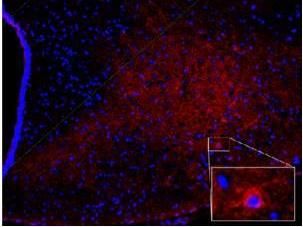A broken calorie sensing pathway
How overeating may lead to more eating
Research is finally beginning to shed light on some of the reasons that extra weight is difficult to shed permanently. Now, a new study has uncovered another method by which the gut senses how much food a person eats and relays that to the brain. When the gut senses too many calories, a pathway that promotes the feeling of fullness becomes blocked.

Stain for the receptor of uroguanylin (blue), a hormone that is reduced when overfeeding causes stress in the cells of the gut. Red stain represents the cells of the hypothalamus (red), a part of the brain that controls feelings of hunger.
Lab of Scott Waldman, Thomas Jefferson University
Through earlier studies on colon cancer, Thomas Jefferson University researchers led by Scott Waldman, M.D., Ph.D., Chair of the Department of Pharmacology and Experimental Therapeutics and researcher at the Sidney Kimmel Cancer Center at Jefferson, noticed that a hormone called uroguanylin also appeared to play a role in obesity. Their studies had shown that in non-obese mice, uroguanylin would travel to the brain, where it produced a feeling of fullness. But it was unclear what happened to this signaling in the obese state.
In the current study, the researchers looked at mice who were overfed, and saw that the small intestines of these mice had stopped producing uroguanylin. The receptors for uroguanylin that reside in the brain were intact, and had even increased in number, but hormone itself was no longer being made, suggesting that overeating had caused its production to shut down. However, when the animals were put on a diet, the guanylin production resumed.
"What's interesting," said Dr. Waldman, "is that it didn't matter whether the mice were lean and overfed, or obese and overfed - urogaunylin production stopped in both groups of animals when they got too many calories." This, says Dr. Waldman, is opposite to what's been observed for other obesity-related hormones like insulin and leptin, which are produced in ever greater quantity as weight increases. "Here, it's not the obese state that's causing the problem but rather it's the calories," he added.
To find out how overeating shuts off uroguanylin production, the researchers looked at the cells in the small-intestine that produce the hormone. They suspected that the endoplasmic reticulum (ER) might be involved. The ER is an cellular organelle that serves as the production line for many of the body's proteins and hormones, and can stop functioning when it is stressed. When the researchers applied a chemical, tunicamycin, known to cause ER stress, mice stopped producing uroguanylin, much as they did when they were overfed. Finally when overfed, obese, mice were given a chemical that was known to relieve ER stress, the animals once again began producing uroguanylin, suggesting that overfeeding caused the ER stress that in turn shut down uroguanulin production.
"Taken together, these experiments show that excess calories - either from fat or carbohydrates - stress small intestinal cells so that they stop producing uroguanylin, which helps people feel full after eating," says Dr. Waldman. "What we don't know is how much is too much and what molecular sensor makes that decision."
"Like in cancer, there are many steps on the way to becoming obese that aren't easily reversed. While the uroguanylin hormone pathway appears to be one of those steps, we don't yet know whether it's important early on in the process, or later, and how much of a role in plays," says Dr. Waldman. "But in combination with other approaches, hormone replacement of uroguanylin may become an important component of therapy to reverse obesity."





















































